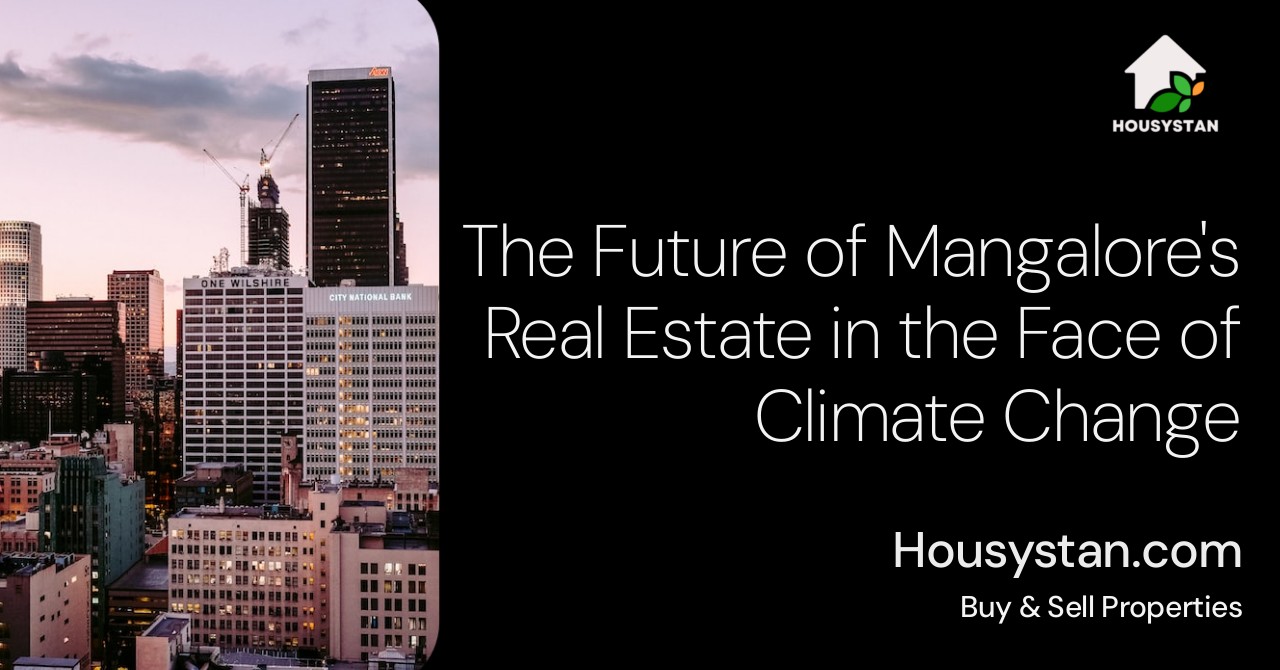The Future of Mangalore's Real Estate in the Face of Climate Change
Read latest blogs and articles from Housystan

The Information mentioned here was last updated on:
29/1/2026The Future of Mangalore's Real Estate in the Face of Climate Change
In recent years, the dynamic coastal city of Mangalore has seen a surge in real estate development. Nestled between the Arabian Sea and the Western Ghats, this scenic region offers not only breathtaking views and cultural richness but also promising opportunities in real estate. However, like many coastal cities worldwide, Mangalore faces an increasingly apparent challenge: climate change. This natural phenomenon has wide-ranging implications for Mangalore's property market, impacting everything from sea levels and weather patterns to investor confidence.
Understanding Climate Change and Its Local Impacts
- Verified Tenants/Buyers
- Unlimited Property Listing
- Zero subscription/charges fee
Climate change refers to long-term alterations in temperature, precipitation, and other atmospheric conditions. Globally, these changes are causing more extreme weather events, rising sea levels, and shifts in ecosystems. In Mangalore, these effects are felt through heavier monsoons, increased flooding, and gradual sea-level rise. Such changes pose significant risks to real estate, making it crucial for stakeholders to adapt and plan for the future.
Rising Sea Levels and Coastal Erosion
Perhaps the most direct threat of climate change to Mangalore is the rising sea level. An increase in polar ice melt and thermal expansion of water is causing ocean levels to rise, which can lead to coastal erosion and loss of land. For Mangalore’s real estate industry, this means a potential decrease in land availability and increased costs for flood defenses. Properties along the coast might face declining values due to increased risk, thus altering the landscape of investment strategies in the region.
Impact on Infrastructure and Urban Planning
Flood Risks and Infrastructure Strain
Flooding has become a more regular occurrence in Mangalore, exacerbated by bouts of heavy rainfall and rising sea levels. These floods strain the city’s infrastructure, bringing into focus the stability and resilience of existing infrastructure. The real estate sector must consider these factors when planning new developments, focusing on flood mitigation measures like improved drainage systems and raised building foundations.
The Need for Sustainable Urban Planning
As climate change continues to impact Mangalore, sustainable urban planning becomes increasingly vital. Developers are being prompted to consider eco-friendly building practices, resilient construction materials, and innovative designs that minimize environmental impact. Green buildings and energy-efficient designs are not only trends but necessities that can help mitigate the adverse effects of climate change.
Market Trends and Investment Opportunities
Shifting Property Preferences
With climate consciousness on the rise, prospective buyers and investors are becoming more discerning about the sustainability of properties. There is a growing preference for homes that incorporate green technologies and are located in areas less vulnerable to extreme weather. This shift in demand influences how real estate is marketed and developed, with eco-friendly features becoming significant selling points.
Investment in Non-Coastal Areas
Given the looming threat of rising sea levels, there is a noticeable shift of interest towards properties located further inland. Regions that were once overlooked are gaining attention as safer investment options. This trend opens up new opportunities in otherwise underdeveloped areas, encouraging growth and infrastructural development beyond the coastline.
Adapting to Change: Strategies for the Future
Insurance and Risk Management
A practical approach to mitigating climate-related risks is through comprehensive insurance policies. Property insurance can cover damage from floods, storms, and other climate-related events. Real estate developers and buyers in Mangalore are paying closer attention to insurance options, ensuring they have adequate protection against nature’s unpredictability.
Government Policies and Community Engagement
Governmental policies can shape the future of Mangalore's real estate landscape. Proactive measures like zoning laws, building codes that account for climate risks, and encouragement of sustainable development practices are crucial. Moreover, community engagement in building climate resilience can drive collective efforts in facing this challenge, fostering a sense of shared responsibility among residents and developers alike.
The Role of Technology and Innovation
Smart Cities and Tech-Driven Solutions
Technology offers innovative solutions to climate-related challenges. The concept of smart cities, which use data and modern technologies to enhance urban living, aligns well with the needs of climate resilience in Mangalore. Smart water management, waste reduction technologies, and renewable energy sources can all play roles in building a climate-resilient urban environment.
Real Estate Technology Adoption
Real estate technology, or "proptech," can facilitate transparency, efficiency, and sustainable practices in the industry. Through the use of digital platforms, developers can simulate climate impacts on proposed projects, allowing them to design structures that withstand future environmental stresses. Enhanced data analytics can also aid investors in making informed decisions aligned with long-term climate trends.
Societal Implications and the Way Forward
Building Awareness and Education
A significant component in tackling climate change is raising awareness among stakeholders about the importance of adapting to its impacts. Educational initiatives can help property buyers, developers, and government entities understand the importance of sustainable practices and risk management.
Long-Term Vision for Mangalore
Developing a long-term vision for Mangalore involves integrating climate considerations into every aspect of urban planning and real estate development. By prioritizing sustainability and resilience, Mangalore can become a model for other coastal cities learning to thrive amidst the challenges posed by climate change.
In conclusion, climate change presents both challenges and opportunities for Mangalore's real estate market. By focusing on sustainable development, innovative solutions, and proactive policies, the city can not only mitigate risks but also open new avenues for growth and evolution in its real estate sector. Tapping into these opportunities while fostering community-wide commitment can ensure that Mangalore remains vibrant, prosperous, and resilient in the years to come.